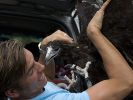Eye For Film >> Movies >> Long Weekend (2008) Film Review
"Not everybody's afraid of Mother Nature, sweetheart. Not everybody's afraid."
A childless, bickering couple takes a break in Eden, only to discover that their civilized veneer barely conceals the full horrors of nature. It could be a description of Lars von Trier's Antichrist (2009), but in fact this is a remake of an Australian film made back in the late 1970s. Still, the self-same thread of ecological concerns that made this enigmatic nature's revenger seem ahead of its time in 1978 makes it seem all too timely in our present age of environmental devastation, global warming and irreversible human hubris. Now is surely the right moment for Colin Eggleston's extraordinary and extraordinarily overlooked original to be revisited – and this new Long Weekend is more reverential remake than voguish 'reimagining', staying remarkably true to both the spirit and the letter of its first incarnation.

After all, director/editor/composer Jamie Blanks has a proven track record as a devotee of Australian Seventies cinema. He was one of the editors on Mark Hartley's Not Quite Hollywood: The Wild, Untold Story of Ozploitation! (2008), and his own previous feature Storm Warning (2007) drew from an unused script penned some three decades earlier by cult Australian horror writer Everett De Roche (Patrick, Roadgames, Razorback). De Roche, who was responsible for the original Long Weekend, here returns to tweak it into an idiom better suited to the Noughties, but not significantly different. The original's Marcia has been renamed as the more contemporary-sounding Carla (Claudia Karvan), and there is the odd concession to such markers of our digital age as mobile phones and SatNav - both ultimately useless, of course, in this super-natural wilderness - but the vast majority of the original lines have been left entirely unchanged.
Blanks, too, is ever respectful to his source, even going so far as to give the couple's car the same number plate as in the original film - while, in homage of a different kind, he names the pub where Peter (Jim Caviezel) stops for directions the 'Eggleston Hotel', and conspicuously dedicates his own film to the late director's memory in the final credits. Not that Blanks fails to put his own stamp onto the material. A reference heard on the car radio to a 'storm warning', and the inclusion of Storm Warning's male leads Robert Taylor and John Brumpton (not to mention De Roche himself) among the drinkers in the pub, serve as a kind of directorial signature.
Other, bigger changes might be regarded as general improvements. The aerial panoramas of Australian coastline with which the film opens advertise the kind of sublime spectacle that the original film's minuscule budget could never afford - even if Eggleston developed his own special visual queasiness out of handheld shots and ground-level steadicam. The model used by Blanks for the (un)dead beached dugong actually looks like a dugong - although again, Eggleston's shapeless blob was no less disconcerting for all its inchoateness. Other fauna in Blanks' film is also much more convincing, greatly reducing the risk that all the animal antagonism should ever drift from unsettling to just plain ridiculous.
Best of all, though, is the way that the couple's relationship, pitched at the same caustically brittle level from start to finish in Eggleston's film, is here drawn with far greater variation and nuance, aided considerably by Karvan's finely tuned performance. A slight downplaying of the film's ecological issues, made possible by the very pervasiveness of such issues in our present culture, means that the asymptotic association between the couple's bitter disintegration and the hostility of their environment – though certainly already an important aspect of the original - is now able to come further into the foreground. This is very much a story where topography and psychology become devilishly confused, and Carla's declaration "We're just going round in circles" clearly refers to much more than disorientation in the bushland.
The first time we see Carla, near the film's beginning, she is on the balcony of her home, oblivious to the fact that Peter is aiming his brand new speargun right at her. From that point on, the narrative spirals around the different cracks and fissures in their marriage - the affairs, an abortion, the cessation of sex, the anger and violence – while at the same time, gradually but still sharp as an arrow, it follows its initial trajectory through to its logical conclusion. Like the second arguing couple whose campervan they pass on the road and later encounter in more horrifying circumstances, Carla and Peter are an accident (if that is the word) waiting to happen. Here nature may, much like that improbably creepy dugong, move in mysterious ways, but she is nonetheless following a course that seems inexorable, irresistible and untameable.
That said, the final ferny image that proved so evocative in the original is here duly botched, both because Blanks removes from his version an earlier, obliquely corresponding image (potted ferns being watered in a modern urban bathroom) that in fact gives the close its haunting resonance, and because he adds after it a coda, both pointless and clunkily over-obvious. And the truth is that while Eggleston's film took many years and just as many knocks to earn its place finally in the pantheon of cult horror, this remake, for all its undoubted qualities, is coasting on its predecessor's hard-won status. Only time will tell if Blanks' work will get completely lost in the straight-to-DVD wilderness, or be rediscovered and recognised, like the original, as an Australian classic - but it remains without question an eerie and ambiguous piece, where an arrow inscribed in the bark of a tree is a cryptic sign of the horror to come, and where savage beasts without mirror harsh nature within.
Reviewed on: 08 Feb 2010



















